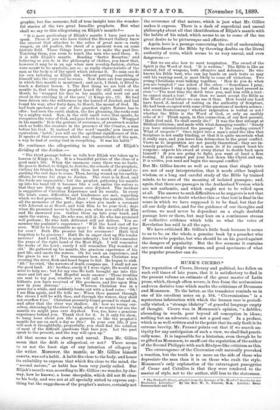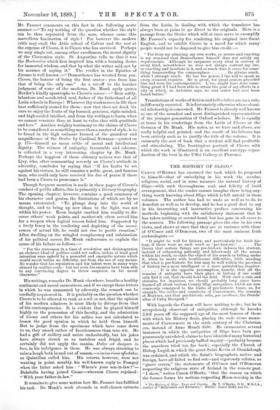MUNK'S CICERO.*
THE reputation of Cicero, literary and political, has fallen on such evil times of late years, that it is satisfactory to find in the present volume an estimate of the great master of Latin prose, which, though often severe, is free from the acrimonious and even derisive tone which marks the criticisms of Drumann and Mommsen. To the latter, as the translator reminds us in one of his excellent notes on p. 164, " Ciceronianism " is a mysterious infatuation with which the human race is periodi- cally visited, a "strange idolatry" of graceful language empty of thought. Cicero was, in Mom msen's opinion, "a dabbler, abounding in words, poor beyond all conception in ideas; nothing but an advocate, and not a good one." In a preface, which is so well-written and to the point that its only fault is its extreme brevity, Mr. Fausset points out that if we search an- tiquity for any anticipation of such a view, we shall find practi- cally none. It is impossible for a historian, even though he be so gifted as Mommsen, to snuff-out the reputation of the author of the Second Philippic with such Bludyer-like criticism as this.
The extravagance of the Ciceronian cult naturally provoked a reaction, but the truth is no more on the side of those who depreciate the man than it is on those who exalt the style. Mommsen's only explanation of the extravagant panegyrics of Camar and Catullus is that they were rendered to the master of style, not to the author, still less to the statesman.
• The Student's Cicero, adapted from the German of Dr. Hunk's" Geschich te der Romischen Literatur." By the Rev, W. Y. Fansset, M.L. London: Swan Sonnensehein and Co.
Mr. Fansset comments on this fact in the following acute manner :—" To say nothing of the question whether the style can be thus separated from the man, whence came this marvellous fascination of style ? For however the modern critic may exalt the Attic school of Calvus and the rest at the expense of Cicero, it is Cicero who has survived. Perhaps we may single out, among other excellences, the moral dignity of the Ciceronian style. St. Augustine tells us that it was the Hortensius which first inspired him with a burning desire for immortal wisdom, and that by what the writer said, not by his manner of saying it." The verdict in the Epistles of Jerome is well known :—" Demosthenes has wrested from you, Cicero, the honour of being the first orator : you from him that of being the only one." As a set-off to the harsher judgment of some of the moderns, Dr. Munk aptly quotes Herder's kindly apostrophe to Cicero's manes :—" Rest softly, laborious and much-tried soul, father of the fatherland of all Latin schools in Europe! Whatever thy weaknesses, in life thou hast sufficiently atoned for them : now that thou art dead, 'tis ours to enjoy the fruits of thy learned, gracious, right-minded, and high-souled intellect, and from thy writings to learn, when we cannot venerate thee, at least to value thee with gratitude and love." Another weighty testimony to the claims of Cicero to be considered as something more than a master of style, is to be found in the high estimate formed of the grandeur and magnificence of the Orator by Cardinal Newman—quoted on p. 175—himself no mean critic of moral and intellectual dignity. The witness of antiquity, favourable and adverse, is collected in a very interesting chapter by Dr. Munk.
Perhaps the happiest of these obituary notices was that of Livy, who, after commenting severely on Cicero's attitude in adversity, concludes by saying that "if his faults be set against his virtues, he still remains a noble, great, and famous man, who could only have received his due of praise if there had been a Cicero to pronounce it."
Though frequent mention is made in these pages of Cicero's conduct of public affairs, this is primarily a literary biography.
The opening chapter, however, contains a good summary of his character and genius, the limitations of which are by no means extenuated. "To plunge deep into the world of thought, and to bring up new ideas to the light, was not within his power. Keen insight enabled him readily to dis- cover others' weak points, and mother-wit often served him for a weapon when logical reason failed him. Supported by a lively fancy in the rendering and depicting of the occur- rences of actual life, he could not rise to poetic creation." After dwelling on the mingled complacency and infatuation of his political career, Dr. Munk endeavours to explain the cause of his failure as follows :—
"For the statesman in a time of revolution and disintegration an abstract ideal of politics could not suffice, unless at least good intention were upheld by a powerful and energetic nature which would recoil before no difficulty, nor from the use of any means. No wonder that his reputation and his talent were in many ways abused by craftier souls : but not even his enemies have been able to any convincing degree to throw suspicion on his moral character."
His writings, remarks Dr. Musk elsewhere, breathe a healthy sentiment and moral earnestness, and if we except those letters in which he was unmanned by adversity, the remark can be
cordially acquiesced in. It is probably on the question whether Cicero is to be allowed to rank as a wit or not, that the opinion of his modern admirers is most likely to diverge from that of his contemporaries. It is evident that he piqued himself highly on the possession of this faculty, and the admiration of Cwsar and others for his sallies was not calculated to lessen the good opinion in which he held them himself. But to judge from the specimens which have come down to us, they smack rather of facetiousness than true wit. He had a gift of raillery and satire undoubtedly, but his jokes have always struck us as tasteless and frigid, and he certainly did not apply the maxim, Duke est desipere in loco, in his indulgence in them. He was always straining to
raise a laugh both in and out of season,----aimius risus afectator, as Quintilian called him. His retorts, however, were not wanting in point, notably his well-known reply to Pompey when the latter asked him : "Where's your son-in-law ?"— Dolabella having joined Ciesar—whereon Cicero rejoined : "With your father-in-law."
It remains to give some notion how Mr. Fawiset has fulfilled his task. Dr. ktunk's work abounds in well:ehosen extracts from the Latin, in dealing with which the translator has always been at pains to go direct to the originals. Here is a. passage from the Orator which will at once serve to exemplify Mr. Fausset's capacity for rendering his original into fluent English, and to exhibit Cicero in a mood for which many people would not be disposed to give him credit :—
"Far from my admiring my own works, so severe and exacting is my standard that Demosthenes himself does not satisfy my requirements. Although he surpasses every rival in oratory of every kind, nevertheless he does not always content my ear, so exacting and insatiate is it, and so much does it crave for some-
thing transcending the commonplace He attains much, while I attempt much. He has the power, I the will to speak as every occasion requires. He is great, for great orators preceded him and were his contemporaries. I, too, might have done some- thing great if I had been able to attain the goal of my efforts in a city in which, as Antonius says, no real orator had ever been heard before."
Translations of works of fiction and belles lettres are/as a rule, indifferently executed. It is fortunately otherwise where classi- cal scholarship is concerned. Mr. Fausset is already well known as one of the soundest and most distinguished representatives of the younger generation of Oxford scholars. He is equally
at home in his renderings from the Latin of Cicero or the German of Dr. Munk. His notes, as we have said above, are really helpful and pointed, and the result of his labours has been entirely such as to justify the title of the volume. It is eminently the sort of book that a student will find profitable and stimulating. The frontispiece portrait of Cicero with which the work is illustrated is an excellent autotype repro- duction of the bust in the Uffizi Gallery at Florence.



















































 Previous page
Previous page